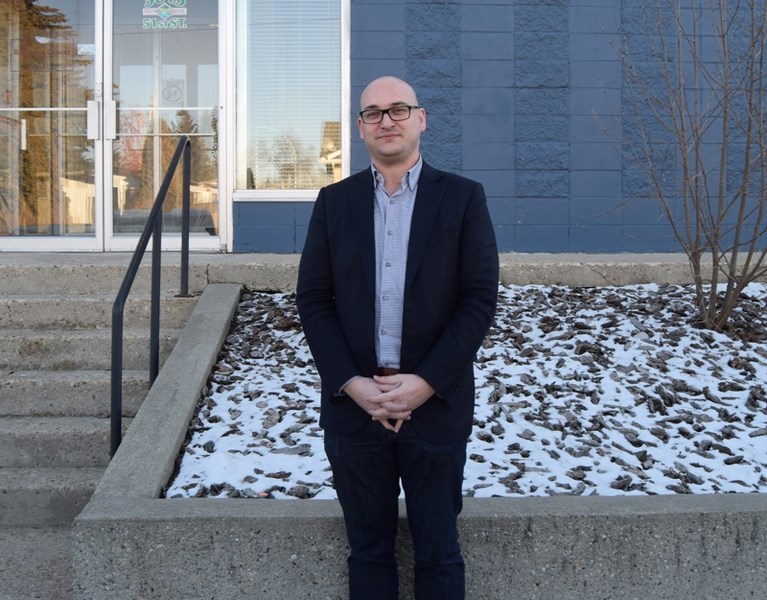The Canadian Association of Petroleum Producers (CAPP) is concerned that the proposed changes the provincial government is contemplating will negatively affect Alberta’s oil and gas industry.
That is the message Chris Montgomery, CAPP manager, E&P communication and engagement, told the Barrhead Leader. He was in town to speak to the Barrhead and District Chamber of Commerce during their luncheon meeting on Thursday, Nov. 19.
CAPP is the largest oil and gas industry group in Canada. Their mission is to advocate for and enable economic competitiveness and safe, environmentally and socially responsible performance.
Montgomery said the association is getting a lot of enquires from not only its members, but the public as well because of the new provincial government and what some of their proposed policy changes may mean to Alberta and Canadian economies.
“It is really an uncertain time right now in the industry with the downturn in the economy and lower oil prices,” he said. “A lot of people are asking us exactly what the downturn looks like and how it may last.”
He said so far this year in Alberta the oil and gas sector has lost 40,000 jobs.
“So obviously communities are beginning to feel the impact of that and lower activity overall,” he said, adding CAPP believes activity in the industry will continue to decrease in the immediate future.
CAPP is estimating this year about 5,700 new oil and gas wells will be drilled across Canada.
“Last year we had drilled over 11,000. So we are about half of where we were last year and yesterday (Nov. 18) the Canadian Association of Oilwell Drillers and Contractors put out a report with their first forecast for next year and they are estimating less than 5,000 wells,” Montgomery said. “So obviously we are going to be experiencing this downturn for a while.”
One of the reasons CAPP members are nervous about the health of the industry over the next few years is that they don’t know what the change in Alberta’s government will mean for the industry.
“It’s not totally new to us,” he said. “We have, as an industry, been working with governments of all stripes across the country for the entire life of the industry, but industry is always nervous about any kind of uncertainty.”
Although Montgomery is quick to credit Alberta Premier Rachel Notley and the rest of the NDP government for their efforts in learning more about the industry.
“But we are concerned about what the implications some of the proposed policies will have depending on the decisions the government takes,” Montgomery said, adding the CAPP is particularly concerned with the issues of climate change and the government’s royalty review.
He said over the last number of years the oil and gas industry, especially in Alberta, have made noticeable strides in becoming cleaner.
“We obviously recognize that industry has a role to play in reducing carbon emissions. If you look at our efforts in the oil sands we have been able to reduce our emissions by 30 per cent over a 25 year period on a per barrel basis,” he said, adding much of the gains have come because of improvements in technology. “But we need to balance our environmental responsibilities with our ability to compete and grow as a sector so we can protect jobs in a downturn and create new jobs when things finally turn around.”
The other issue the CAPP is concerned about is the increase in the Alberta’s environmental levy and where that money is going.
“The oilsands already pays a levy on carbon emissions. It was $15 per tonne and under the new government it has been doubled to $30 a tonne. One of the principles that is important to us is that money continues to be put into a technology fund that companies can access to test and commercialize new technology,” Montgomery said. “Because we are not going to solve the problem of emissions by simply putting a price on them. They are going to be solved through technological innovation.”
CAPP’s other main concern is the Alberta government’s royalty review on the oil and gas industry.
The province announced in August that it would not change the province’s royalty rates until 2017. The Royalty Review Advisory Panel says it will conclude its work by the end of 2015.
The CAPP said compared to many other oil producing jurisdictions Alberta already pays high government royalties.
“We have to compete and attract investment to help us continue to grow this sector and therefore generate more revenues for government both in terms of revenue and through job creation and contributing to the overall economic health of the province,” he said. “The royalty review creates an uncertainty and we need to bring some of that certainty back.”



